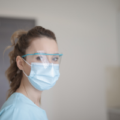BOHS expresses apprehension about the reporting of WHO recent findings on COVID-19 airborne transmission
The British Occupational Hygiene Society, one of the world’s most authoritative organisations on exposure to harmful substances and organisms and worker health, has expressed apprehension about the reporting of World Health Organisation’s recent findings on COVID-19.
The WHO recently reviewed research https://www.who.int/news-room/commentaries/detail/modes-of-transmission-of-virus-causing-covid-19-implications-for-ipc-precaution-recommendations, mainly from China, has indicated that cases of infection have not resulted from airborne transmission of the virus carried in very small droplets that may be capable of travelling over distances greater than 1 meter. Ensuing reports that “COVID-19 is not airborne” have circulated on various social media sites.
BOHS President, John Dobbie expressed concerns that this could lead to dangerous misunderstandings:
“While the evidence of airborne transmission has not been consistently found in studies reported to the WHO, it should be cautioned that airborne transmission may be possible in specific circumstances and in particular healthcare settings involving many common medical procedures.”
“Of greater concern to BOHS is the alternative message that the broader public might mistakenly take from it. Some may think that the inference that it is not transmitted by airborne methods is effectively telling us that one can only get it by touch (i.e. direct skin contact). The droplets caused by coughs and sneezes are the primary means by which the infection is spread, so people need to maintain social distance and hygiene precautions.”
In addition, BOHS has been actively working to ensure that health workers are equipped with proper-fitting and suitably graded protective equipment and emphasized the importance of following the scientific principles and standards that govern the optimal choices for protection.
“There’s still a lot that we don’t know about this virus,”
John added,
“But what we do know is that having the right equipment for the right healthcare context is vital to the safety of NHS workers and to prevent the spread.”





